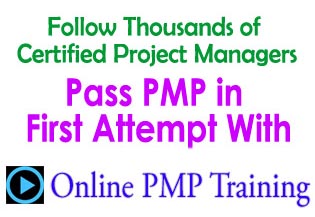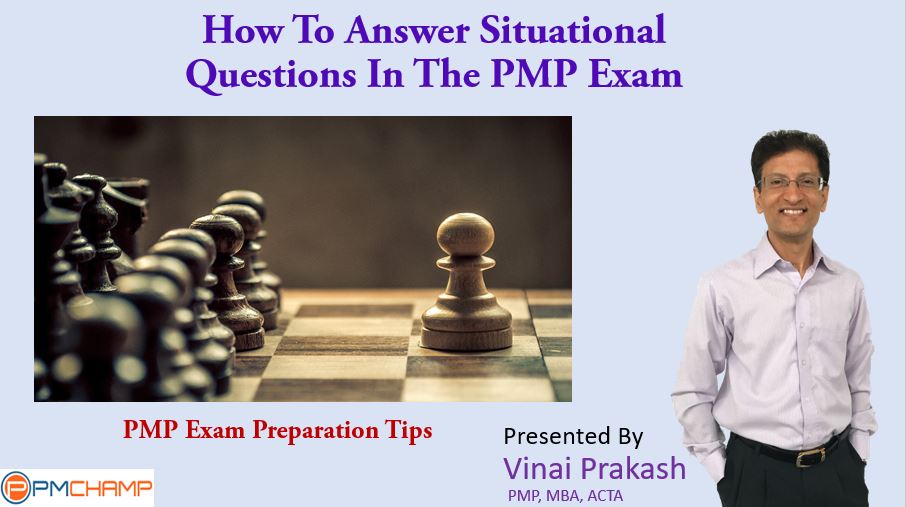More and more people taking the exam are realizing that the PMP exam is more than answering ITTO (Inputs -> Tools & Techniques -> Outputs) type of questions. We’ve dealt with how to answer ITTO questions, choosing the Best PMP answer, and several Cost Questions, Formula Questions, and Contract Questions in the past articles on PMchamp.
There is another breed of questions, which are giving a lot of grief to PMP aspirants. These are rather long, and situational questions. Such questions provide you with a lot of background information, and assess your PM Skills with the given problem. Actually, these questions are really trying to test you on your Problem Solving skills – which is an essential must have for project managers.
The problem question will have many Correct, or seemingly correct answers, which are traps, and if you are not prepared, you will be caught off guard. You need to be very proactive, and think carefully, before answering these questions.
Let’s analyze a Mock PMP Question here:
You are working on a project to create state of the art diving equipment that can take you safely to depths of 300 feet in deep ocean. The projcet is on schedule, and budget allocations and spending is continuing as per normal. However, lately there has been a rumour that the blueprint for the new design is not original, and you, the Project Manager have just been sued by a competitor for copyright infringement. To say that you are worried is an understatement. Such problems was never discussed during the risk planning activities, and were therefore, never added to the risk register. To deal with the situation, it will now cost the project a lot of time and money. What is the BEST response for this situation?
A. Don’t take any action, just accept that there’s a problem that the team did not plan for.
B. Stop all project activities and approach senior management for advice on this problem immediately.
C. Add the risk to the risk register and begin gathering information about its probability and impact.
D. Use the management reserve to cover the costs of the problem.
What’s your answer? Quick, don’t think too long, and come up with the answer.
Understanding the Problem at Hand:
Now, let’s analyze the options, and identify the best answer… that’s what was asked in this mock PMP question…
Your are now facing a problem, which was not anticipated, or planned for. There is nothing in the Risk Register, and it is an unexpected problem, that you have never thought of. It has big implications…
There is pressure on the reputation of the company, legal liability, and this will cost a lot of time & money to the company. Thus, you need to carefully look at the options, and then choose your answer.
Analyzing The Options Given:
One of the common pitfalls for PMP exam aspirants is that they think about the BEST situation that they would do, and then search for it in the answers. But this is not the best idea. You should always look for the BEST option of the given 4 choices. The answer you choose should be the Best of these 4 choices, even if the chosen answer is not what you would do in a real situation.
An important tip for such questions is to NOT mix the choices given with your real life experience, but strive to eliminate the wrong choices, and pick the Best of the 4 choices… even if it seems illogical or most improbable one..
Choice A tells you to do not do anything. After all, legal things can take many months, and you’ve just been notified. Such choices are checking if you wait for the problem to actually materialize, and/or grow bigger, before you would take any action. This is not a good option to choose. After all, you are a Proactive Project Manager. You will anticipate problems, and will develop risk mitigation strategies, Contingency plans, and if they actually occur, you will be prepared with the impact analysis, action plan, and have a team member responsible and ready to take action, and be on the lookout for it…
Choice B seems a good option. It says that you should go to the senior management, inform them of the impending problems, and ask for their guidance or advice immediately. After all, with such dire consequences, it seems wiser to keep them updated, and ask for their support. It actually makes sense, but there are 2 issues with this choice:
a. It says that Stop all project activities. It is fine to seek advice, but why stop all other activities? Stopping all other activities will further jeopardize the remaining activities of the project.
b. Solving all project problems is your job. That’s why you were appointed the Project Manager in the first place. If you go to the management, and expect them to solve your problems, you are not doing your job well. Of course, if you come up with solutions to solve the issue at hand, and seek their approval on such a big change, then it is in accordance with the Integrated Change Control Process. You could then be using the escalation process, calling an emergency meeting of the Change Control Board etc., and advice them of the problem, and probable solutions, helping them make an informed decision.
Choice C seems perfect. It admits that you goofed up earlier, and missed identifying this Risk in the Risk Register. It then does damage repair, by adding this risk to the risk register, and subsequently begin gathering more information about the probability and impact of the problem at hand.
However, do note that we are not in the planning stages now… Such kind of things are better done during the planning stages. Now the problem has happened, and the issue in very close at hand… it is time to execute the plan, not begin planning now.
Adding to the risk register is fine, but gathering information about its probability is futile now… the problem has already happened. As a PM, you first job is to fix the problem. Just because it was not noticed/tracked/thought of earlier does not mean that we can’t start and fix it first.
Choice D seems improbable. How can you use the management reserve without management approval. There is no mention of seeking management approval. Should you use it, or use the contingency reserve?
Only Change is Constant. Even with the best of planning, things will go wrong. That’s why we setup a Contingency Reserve – for the known unknowns… like Inflation. We know it will happen, but we do not know the %, or when it will be sharp or less… It depends on the market forces. Therefore, for the things that you can forsee, we create a contingency reserve and use it at things happen.
And for things that are unknown, unheard of, we setup a Management Reserve. This amount rests with the Management (Sponsor, senior management etc.). The Project Manager is aware of this fund, but can not use it without getting approval from the management. Further, it should be only used for the Unknown Unknowns – things are unknown, and have not been planned for.
Be careful about using this fund. You can’t say that a user changed their requirement, and I had not planned for it, therefore I’ll use the Management Reserve. This was a forseeable thing, and you should only use your own funds, or tap the Contingency Reserve, but not the Management Reserve.
With the problem at hand, you have not planned for it, you had not anticipated it, and now you are caught off-guard. Go to management, tell them about it, and use the management reserve (after getting their permission of course)… They may not be happy about the situation. But we are not here to make everyone happy, but to deliver a project successfully.
A problem has happened, or is happening, and the first job as a PM is to solve problems before they arise (preventive action – best course), or when they arise (reactive action – not the best, but better late than never… after all, cost of making a change increases as time goes by).
Thus, looking at the choices, it is best to choose Option D.
Hope this helps you in answering long winded, detailed and situational questions in the PMP exam.
By the way, it has been some time since the PMP exam changed last year. Make sure you are aware of the changes! And work out your study plan for the PMP exam.


I would answer B because getting sued is way outside the PM’s league. Senior management has to act in this regard, and stopping all other activities is ethically proper, until it is know what risk impact those activities will bring from the suit.
Rightly you have put it that the PM has no jurisdiction over the management reserve, and because Option D did not elaborate further that that the PM seeks senior management to use the funds to counter the suit and/or damages, we cannot guess more into the answer that is already provided.
I really question their logic on the answer as well. Copyright infringement is breaking the law and warrants managements immediate involvement. I would suggest that D? is wrong because it fails to address notifying management of the issue.
I just failed my exam and this is exactly how most questions were. “Take action, Do nothing, Add to a document, use some funds, etc…” just multiply this X70 questions. What would you do? What is next? What’s the best chart that shows what you want. The most frustrating exam ever.
This was a very good mock question, as I got it wrong.
Thanks for reading and liking this PMP mock question. We all learn from our mistakes. Hope it will help you in achieving your dream and get your PMP certification fast! Cheers – Vinai
I’m with M.U. Most of the questions were just like this on the exam. You have to answer according to PMI’s standards, NOT your field experience. Good Luck!
my answer is C – read the read the question find the Key works here
rumour
never added to the risk register
it plays major role in this question to choose the BEST answer
Agree that ‘D’ fails to account for getting permission to use Management Reserves. Maybe I am reading the question wrong, but problem statement tells me that the lawsuit is part of the rumor. Thus it has not happened yet. To me, this is a new risk that needs to be put in Register and investigated carefully so that PM can mitigate now (buy data rights with Contingency funds), or escalate to managers later (bring in legal team to deal with suit when it arrives).